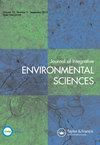基于可比GPC框架的城市二氧化碳当量核算研究——以欠发达城市南宁为例
IF 3.5
4区 环境科学与生态学
Q3 ENVIRONMENTAL SCIENCES
Journal of Integrative Environmental Sciences
Pub Date : 2018-01-01
DOI:10.1080/1943815X.2018.1447970
引用次数: 2
摘要
摘要对中国南宁市等欠发达地区的二氧化碳当量(CO2e)进行核算是一种创新。同时,《社区规模温室气体排放清单全球议定书》(GPC)被认为是计算城市二氧化碳排放量(CE)的全球可比框架。因此,本文采用GPC方法计算南宁市1994-2015年的消费水平。结果表明:南宁市的总CE(含范围2的电力CE)从1994年的656 Mt快速增长到2015年的5544 Mt,年均增长率为10.69%,总量为233 Mt,其中工业能耗、交通运输和工业过程对总CE的贡献最大,分别为29.72 ~ 61.09、10.75 ~ 41.87和7.40 ~ 14.99%。几乎总是,南宁超过90.94%的行政长官与煤炭有关。如果只考虑煤炭、石油和天然气的碳排放,南宁市的单位面积碳排放和单位GDP碳排放始终高于世界,但由于南宁市大部分年份的经济不发达状况,其碳排放始终低于中国。因此,南宁市有必要走低碳发展道路,并提出了相应的对策建议。本文章由计算机程序翻译,如有差异,请以英文原文为准。
Study of urban carbon dioxide equivalent (CO2e) accounting based on the comparable GPC framework: a case of the underdeveloped city, Nanning, China
Abstract It is innovative to account for the carbon dioxide equivalent (CO2e) of underdeveloped regions such as Nanning city of China. Meanwhile, the ‘Global Protocol for Community-scale greenhouse gas emission inventories (GPC)’ has been considered a worldwide comparable framework for calculating urban CO2e emission (CE). So, the CEs of Nanning were calculated during 1994–2015 by the GPC methodology in this paper. The results show the total CE of Nanning, containing the electricity CE of Scope 2, grew rapidly from 6.56 Mt in 1994 to 55.44 Mt in 2015, with an annual average increasing rate of 10.69% and amount of 2.33 Mt. The biggest three contributors were industrial energy consumption, transportation and industrial processes, which contributed 29.72–61.09, 10.75–41.87 and 7.40–14.99%, respectively, to the total CE. Almost always, more than 90.94% of Nanning’s CE was related to coal. When considering only the CEs from coal, oil and gas, both these CEs per unit area and per GDP of Nanning were always greater than those of the world, although less than those of China due to the underdeveloped status of Nanning in most years. So, it was necessary for Nanning to pursue the pattern of low-carbon development, and some corresponding countermeasures were recommended.
求助全文
通过发布文献求助,成功后即可免费获取论文全文。
去求助
来源期刊

Journal of Integrative Environmental Sciences
ENVIRONMENTAL SCIENCES-
CiteScore
3.90
自引率
0.00%
发文量
13
审稿时长
>12 weeks
期刊介绍:
Journal of Integrative Environmental Sciences (JIES) provides a stimulating, informative and critical forum for intellectual debate on significant environmental issues. It brings together perspectives from a wide range of disciplines and methodologies in both the social and natural sciences in an effort to develop integrative knowledge about the processes responsible for environmental change. The Journal is especially concerned with the relationships between science, society and policy and one of its key aims is to advance understanding of the theory and practice of sustainable development.
 求助内容:
求助内容: 应助结果提醒方式:
应助结果提醒方式:


